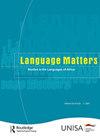计算机辅助教学与语言学习:来自Mavis Computel的英语-约鲁巴语口语书的证据
IF 0.8
3区 文学
0 LANGUAGE & LINGUISTICS
引用次数: 1
摘要
摘要本文探讨了使用Mavis Computel的英语-约鲁巴语口语书和笔进行计算机辅助语言教学的有效性。采用发展设计,来自受过高等教育的约鲁巴家庭的21名10岁儿童被分为实验组和对照组。这些小组在同一地点、同一时间但在不同的班级进行了为期三个学期的学习。这两组学生都和其他学生一起在国家小学毕业考试中写下了约鲁巴语试卷。尽管实验组在检查中表现良好,但对照组的表现要好得多。这些书的内容是根据NERDC课程安排的。有声读物在约鲁巴语教学中采用的这种方法使用户能够通过模仿、重复和视听内容来自学。这篇文章鼓励政府在谈话书的进一步发展中进行合作。本文章由计算机程序翻译,如有差异,请以英文原文为准。
Computer-Assisted Instruction and Language Learning: Evidence from Mavis Computel’s English–Yoruba Talking Books
Abstract This article examines the effectiveness of computer-assisted language instruction using Mavis Computel’s English–Yoruba talking books and pen. Using a developmental design, 21 children, aged 10, from highly educated Yoruba families were divided into an experimental and a control group. The groups were subjected to a study session in the same venue and at the same time but in different classes for three academic terms. Both groups wrote the Yoruba paper in the compulsory National Primary School Leaving Examination written along with other students. Though the experimental group did well in the examination, the control group performed much better. The contents of the books are structured according to the NERDC curriculum. This methodological approach the talking books adopt to the teaching of Yoruba enables the users to teach themselves through imitation, repetition, and audio-visual content. This article encourages government collaboration in the further development of the talking books.
求助全文
通过发布文献求助,成功后即可免费获取论文全文。
去求助
来源期刊

Language Matters
Multiple-
CiteScore
1.20
自引率
0.00%
发文量
19
期刊介绍:
The purpose of Language Matters is to provide a journal of international standing with a unique African flavour focusing on multilingualism in Africa. Although the journal contributes to the language debate on all African languages, sub-Saharan Africa and issues related to multilingualism in the southern African context are the journal’s specific domains. The journal seeks to promote the dissemination of ideas, points of view, teaching strategies and research on different aspects of African languages, providing a forum for discussion on the whole spectrum of language usage and debate in Africa. The journal endorses a multidisciplinary approach to the study of language and welcomes contributions not only from sociolinguists, psycholinguists and the like, but also from educationalists, language practitioners, computer analysts, engineers or scholars with a genuine interest in and contribution to the study of language. All contributions are critically reviewed by at least two referees. Although the general focus remains on multilingualism and related issues, one of the three issues of Language Matters published each year is a special thematic edition on Language Politics in Africa. These special issues embrace a wide spectrum of language matters of current relevance in Southern Africa.
 求助内容:
求助内容: 应助结果提醒方式:
应助结果提醒方式:


